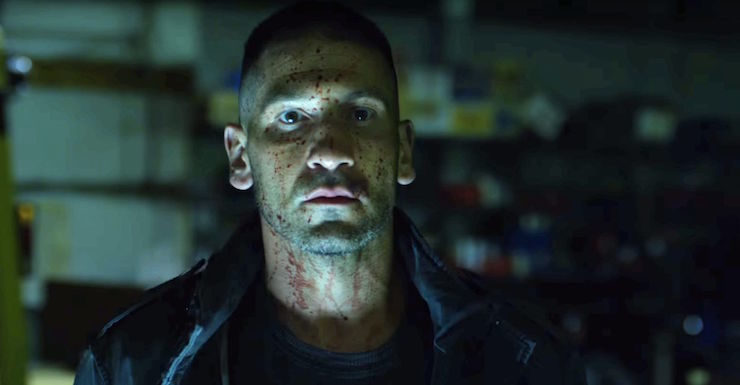Netflix’s little corner of the Marvel Cinematic Universe has been focused on more street-level stuff rather than big battles to save the world. The highest stakes we’ve seen have been to save a neighborhood or a city or maybe just a few people, but that’s often enough.
The Punisher both continues that trend and subverts it. Unlike every other protagonist in an MCU film and a Netflix show in particular, Frank Castle doesn’t have powers (Daredevil has his super-senses, Iron Fist has his titular ability, Luke Cage and Jessica Jones have super-strength) or extranormal enhancements (armor, webbing, magic hammer, shrink ray). And nobody really gets saved here, which is fitting, as the Punisher isn’t a hero. What this is more about is exposing corruption.
Show-runner Steve Lightfoot (who is inexplicably listed as the “creator” of the show) takes this all about ten steps further by completely removing Castle from any semblance of the MCU.
SPOILERS for this series and the rest of the Marvel Cinematic Universe
Most of the comic-book portrayals of the Punisher have been about vengeance and violence. Frank Castle is very much based on Mack Bolan, Don Pendleton’s “Executioner” character, whose family was killed by the mob and who takes out the mob in revenge for that act. Castle’s backstory is similar, but Marvel’s The Punisher adjusts things so that the mob is just the cover. The strings of the killers of the Castle family were being pulled by a rogue CIA operation.
But while that would seem to give us the vengeance and the violence, that’s deemphasized to instead provide us with one part of Castle’s backstory that usually stays in his backstory: his military background. Lightfoot’s interest here is in exploring PTSD, and the different ways people in combat react to not being in combat anymore.
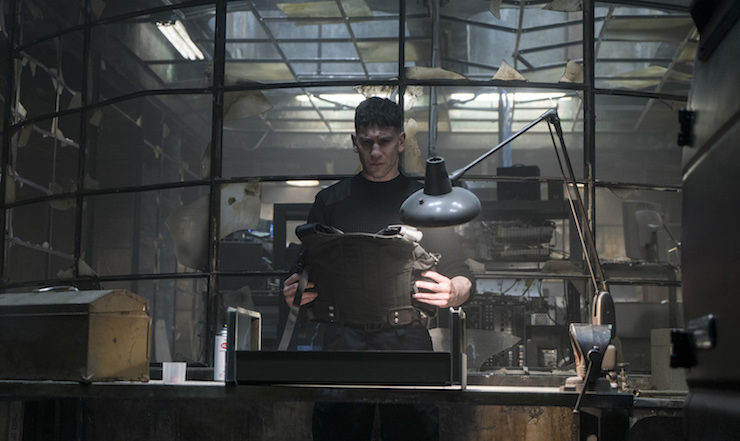
As far as that goes, it’s an interesting aspect of Castle’s personality to explore. The storyline expands it, showing not just Castle, but other ex-combatants: Curtis Hoyle, who lost a leg, and leads group therapy sessions; Billy Russo, who went and formed the Blackwater-esque Anvil, so he can still be a soldier, but make more money at it; Lewis Walcott, who is utterly unequipped to handle the real world, digging a trench in his backyard so he can sleep, and eventually killing his best friend and becoming a bomber; O’Connor, mad at the world, and refusing to accept reality, or consequences; and Castle himself, who keeps finding another war to fight.
All the actors here do superb work, and that’s what sells a lot of it. Jon Bernthal in particular continues his stellar inhabiting of Castle, putting him miles ahead of the last three guys to try it. Castle is a person with spectacular skill for violence, who was able to hold onto his humanity because he had his family and the love of his wife and kids. Lightfoot sensibly doesn’t completely sugar-coat Castle’s family life—we see him angry at his kids and arguing with his wife a couple times in flashbacks and dream sequences—but he’s still a much different person before his family dies. Having said that, we see flashes of it, particularly when he deals with Sarah Lieberman and her kids, though it’s more subdued. And generally, Castle is allowed to be a complex character, which puts him one up on Bolan, on the three previous Punisher movies, and on the more simplistic character treatments in the comics (though there are plenty of nuanced portrayals in four-color as well). Bernthal is very much up to the challenge, and if nothing else, The Punisher gives us a Frank Castle who is far more complex than a simplistic kill-all-bad-guys character.
It also gives us a plot that actually is worthy of thirteen episodes, which makes it unique among the six Marvel Netflix seasons that are a baker’s dozen parts long. Lightfoot takes the time needed to establish his characters, to let the plot breathe, and also to show numerous aspects to each theme. There’s family: Castle’s loss of family; Lieberman’s temporarily loss of family, as well as his creepy insistence on spying on them clandestinely while they think he’s dead; there’s Madani’s speech to Stein about how dedicated agents can’t have families; and there’s the sense of family among the military, a bond that continues after one’s enlistment is done.
There’s also doing what’s right versus doing what’s legal. It isn’t just our titular protagonist who struggles with that (well, okay, Castle doesn’t struggle with it at all, he just does what he thinks needs doing), but half the cast deals with it. Madani hides information from her superiors because she doesn’t know who in authority to trust; Lieberman fakes his own death because when he followed procedure, he got framed; both Walcott and O’Connor think the system is rigged against them and act against it, O’Connor mostly with just bitching and moaning, Walcott with bombs; Karen Page has to be reminded by her boss that they have to talk to the FBI before they publicize Walcott’s letter to her; and even our bad guys face it, as Rawlins started Project Cerberus because he felt it was needed to keep America safe, even if it was horribly illegal and despicably immoral. All of these themes stretch out over the entire season.
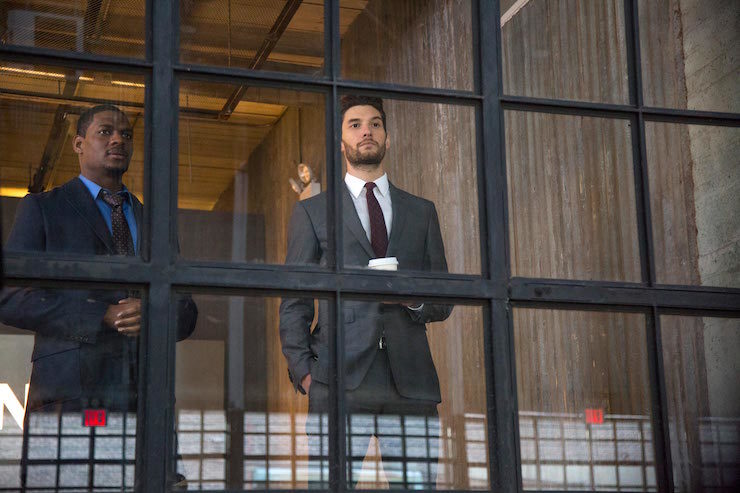
We also get a wide range of folks. Yes, there are evil government agents in Rawlins and Wolf and Bennett (though I’m really really really sick and tired of the trope of showing that people are corrupt because they’re into BDSM), but there are also good ones in Hernandez and James (played excellently by, respectively, Tony Plana and Mary Elizabeth Mastrontonio), as well as Madani and Stein and Lieberman. Not all the ex-military are crazed killers like Walcott and Castle, or venal shits like Russo, there’s also Hoyle and Gunner Henderson (the unsung hero of the season, as his video is the key to the whole story) and the other people in Hoyle’s group therapy.
In fact, the only real issue is the first episode. It felt out of place after I’d watched the first three, and it’s even more so after watching the remaining ten. “3AM’s” purpose is to get Castle back into the Punisher game, but he was already there when we saw him last, and we aren’t seeing him there now because the cold open dispenses with it for some reason.
And therein lies The Punisher’s biggest issue. We left Castle all set up for his solo series at the end of Daredevil season 2, with a cache of weapons and a desire to nail everyone connected to killing his family. He does that before the credits roll in “3AM,” and later the weapons are gone, as Turk sold them to someone else.
That’s the first of many ways in which Lightfoot runs completely away from the fact that this is in the MCU. We do have several characters show up—Schoonover, established in DD as Castle’s CO in Afghanistan, appears in flashback (always good to see Clancy Brown), Page is in several episodes, Turk shows up that one time, Page’s involvement with taking down Wilson Fisk is mentioned, plus we also get Page’s boss Ellison, and Detective Mahoney from DD appears in the brilliant tenth episode “Virtue of the Vicious,” a vaguely Rashomon-esque look at Walcott’s attack on a pro-gun-control senator. (Honestly, even if the rest of the season sucked, I absolutely adore that tenth one, a magnificent standalone amidst the serial narrative.)
But those appearances only highlight how much the series avoids acknowledging that it’s part of the MCU. At no point, for example, is Daredevil mentioned, even though he was established as being one of Castle’s main inspirations for taking on the mantle of the Punisher.
This is a significant flaw for several reasons. I hasten to add that it’s not because it would be cool to see background mentions of other events (like the earthquake in The Defenders) or people (like, say, a commercial for Mariah Dillard), though it would be. That’s not really necessary though. Fan service can be fun, but it’s not required.
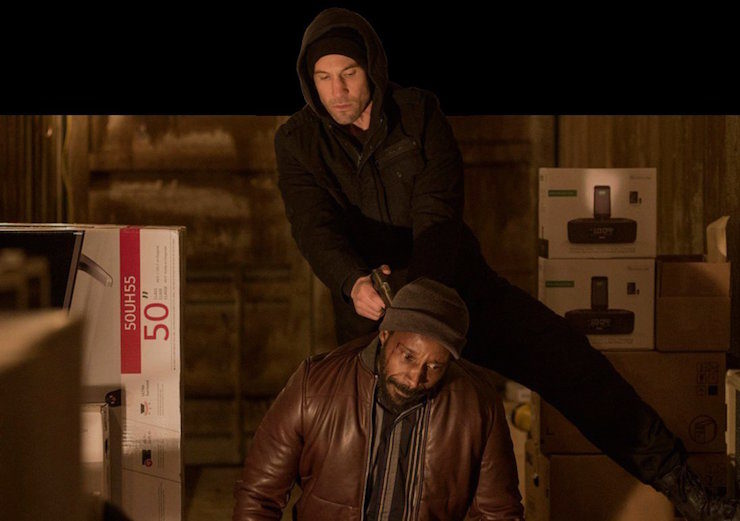
No, there are two problems with Lightfoot’s lack of desire to even acknowledge that this takes place in the same world as the other Netflix shows, not to mention the movies, one small, one large.
The small one is simply that of expectations. The Marvel logo is on top of the title and appears at the beginning. When you see that word, you figure this will be a fantastical world of heroes and villains and people with extra-normal abilities far beyond those of normal humans. The Netflix series in particular have been superb at showing the real-world consequences of those powers on ordinary, everyday people.
Bigger than that, though, is the fact that this show raises all kinds of issues about taking the law into your own hands, and about gun control, and about the struggle between danger and safety. But those arguments—which we see a lot of particularly in “Front Toward Enemy” and “Virtue of the Vicious”—are exactly the same as we’d hear in the world today, and are hearing quite a lot of. In fact, they’re depressingly simplistic ones, particularly Walcott and O’Connor’s fear of having their guns taken because then they won’t be able to overthrow the government if it gets too corrupt. (I wish someone would have pointed out that that particular interpretation of the Second Amendment is one that became useless around World War II. The government has tanks; the government has missiles; the government has drones. There’s really not much you can do against that with a few assault rifles and bullets…)
Here’s the thing: that argument would have to be much different in the MCU. This is a world in which a lot more people take the law into their own hands. It’s a world in which people have, without any legal authority, taken down the likes of Fisk and Willis Stryker and the Hand and Kilgrave and the Vulture—not to mention the Chitauri invasion—and that’s just in New York! Vigilantism is much more of a thing in the MCU, and a story that actually examined how that would affect the gun-control debate would have been much more interesting than the warmed-over treatment it gets here.
It’s especially maddening with Page, who has a concealed carry permit because of what she went through in the two seasons of Daredevil, and the specifics of that are never brought up. Hell, Page has several costumed vigilantes among her acquaintances (not just Castle and Daredevil, but Iron Fist, who went to her with a story in his first season, plus she at least came across Jessica Jones and Luke Cage in The Defenders). But never is that particular aspect of this world mentioned, and it takes the wind out of its sails.
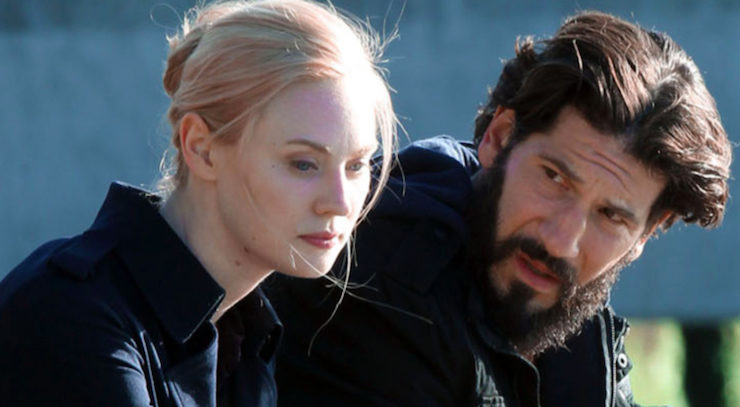
To make matters worse, there are several character fates that are 100% dictated by the fact that they’re existing comics characters—starting with the lead. CIA and DHS giving Castle a free pass in “Memento Mori” just doesn’t pass the smell test at all. We’re talking about a multiple mass murderer, and he should be in Supermax. Hell, he gave his testimony to Madani without any expectation of immunity. In addition, it makes no sense, none, that Castle leaves either Turk alive early on or Russo alive at the end. In both cases, it’s because they’re existing characters, the former having shown up in DD, Luke Cage, and The Defenders, the latter the analogue to Punisher’s comics nemesis Jigsaw. Instead of killing Russo, Castle obligingly gives us Jigsaw’s comics origin, tearing the good-looking man’s face up. It feels constructed and out of place, especially given how aggressively Lightfoot has avoided four-color connections generally.
Having said all that, Marvel’s The Punisher is still a good series. The acting is uniformly phenomenal—I haven’t even mentioned Jaime Ray Newman’s brilliant turn as the emotionally exhausted Sarah, or Paul Schulze’s equally brilliant performance as the super-controlled Rawlins, who finally loses that control when Castle’s actions result in him losing his cushy-tushy CIA job, or the generally excellent work by Jason R. Moore as Hoyle, Delaney Williams as O’Connor, Daniel Webber as Walcott, Ripley Solo as Lieberman’s daughter, and Amber Rose Revah as Madani.
But it could’ve been a great series if they actually acknowledged the possessive at the beginning of the series title.
Keith R.A. DeCandido writes “4-Color to 35-Millimeter: The Great Superhero Movie Rewatch” for this site every Friday. His other work for this site includes reviews and essays on Star Trek, Stargate, Batman, Wonder Woman, Doctor Who, and the other Marvel Netflix series. He’s also written several Marvel characters in prose, most recently the “Tales of Asgard” trilogy featuring Thor, Sif, and the Warriors Three, as well as novels and short fiction featuring Spider-Man, the X-Men, the Hulk, and the Silver Surfer.










